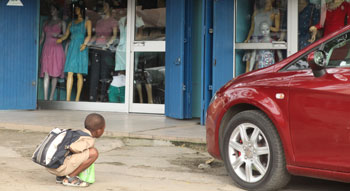Roads in Ivory Coast: Road Network, Road Investments
Ageroute is both an independent entity as well as the agency of Ivory Coast responsible for road maintenance and funding. Ageroute was specifically charged charged with coordinating and supervising the extension of the country’s road network and the renovation of existing roads.
Roads in Ivory Coast: Road Network, Road Investments
AKFED operates more than 90 separate project companies, and employs over 30,000 people. The project companies of the Aga Khan Fund for Economic Development (AKFED) generated revenues of US$ 2.3 billion in 2010 and all surpluses are reinvested in further development activities.
Ageroute is both an independent entity as well as the agency of Ivory Coast responsible for roads’ maintenance and funding. It was created in 2001 as a thorough reform of highway maintenance. Together with the Road Maintenance Fund (RMF), which was created to reform the financial mechanisms, Ageroute was specifically charged with coordinating and supervising the extension of the country’s road network and the renovation of existing roads.
The reform that gave birth to Ageroute and the RMF was prompted and supported by donors like the World Bank, the European Union and the African Development Bank with the desire to give the two organizations operational flexibility to plan new roads. Despite a reduced budget due to the global financial crisis and civil unrest, Ageroute is making plans to reclaim Ivory Coast’s place as a regional hub of commerce.
“We have implemented road-management mechanisms, such as a reclassification bill and a new database,” says Bouaké Fofana, director general of Ageroute. “We also have skilled and experienced personnel in the roads’ sector. What we lack currently are SMEs and large construction firms to handle the volume of work to be done.”

Beyond its core mission, Ageroute is also involved in finding partners for the commercialization of roads in Ivory Coast. Ageroute has launched such key projects as the north-south highway, Abidjan-Grand Bassam Highway and rehabilitation of roads in Abidjan and Bouaké.“The stage is set for a new beginning for Ivory Coast,” says Mr Fofana.“To enhance the goals of our ports, we need a good road network.”
The Opportunity for Investment
The roads network is in really bad shape,” says Bouaké Fofana, Director General of Ageroute. After twelve years of government instability, coups d’etat, civil unrest and finally civil war, one of the best roads systems in Africa needs investment to rebuild. The simple fact is that Côte d’Ivoire has “not been doing a good job maintaining the existing network.” As a result, he says
“Today, with the change, we need to rebuild the whole roads network. This is a very ambitious program we are putting together: from 2012, we are planning to rehabilitate 1,000 km of paved roads a year and 5,000 km of cinder roads every year. The intercity roads have not been maintained in the past 10-15 years. In Abidjan, we have done very little in the past 10-15 years, so we have to rebuild every road in Abidjan in the next 5-10 years.“
The result is: “Now we really need to rebuild the whole network.”
“If you look at the paved roads, they are built for 15 years normally, and within those 15 years, you’re supposed to have yearly maintenance and every 5-6 years, you have to build at least the upper layer of the roads. Having not done that for the past 10-15 years means that basically all the roads are now beyond their existing lifetime.“
Acording to Fofana, there are approximately 6,500 km of paved roads, and 70,000 km of unpaved roads in Ivory Coast. However, not only do these roads need to be rebuilt, but for the growth of the Ivorian economy a vast expansion must take place. This means first, a need for international road and bridge contractors to enter the scene. Fofana explains:
“There is no way we can achieve the goal of rehabilitating the whole network within the next 5-10 years if we are not able to bring in international companies. We need to attract big contractors from everywhere in the world, and being able to do so will be the key success factor. We may have all the funding we need, but without international player in the field, Ivory Coast will not be able to achieve the goal.“
Second, it means that Ivory Coast, Ageroute, and the RMF are seeking foreign investors. Fofana is quick to assure investors that they will enjoy doing business in Côte d’Ivoire:
“I can assure any international contractor that comes to the Ivory Coast that the process is transparent; we’ve never been criticized for that and there is an issue of corruption in the process but that is not a big issue. The new government has stressed enough that we want all those bad habits we have taken in the past to stop.“
“Today if you are bidding for a project, your offer will be open in a room where everybody is around and we know what the best offer is and the project should go to the best offer, unless there is a very good reason why it shouldn’t go to the best offer. Now most of the big projects will go through a prequalification process, that will allow us to do the bidding among people technically qualified to do the job.“
“I am very confident that the process will be transparent—it has always been transparent—and the Ivory Coast has a long tradition of public and private partnerships. I believe we are really set up to do a good job if we can attract big contractors and they don’t have to worry about the problem of transparency, because projects will be funded by international organizations like the World Bank, the European Union, the African Development Bank, and the French Development Agency, so they will all be there to supervise the process and I can assure investors that the process will not be rigged in any way.“